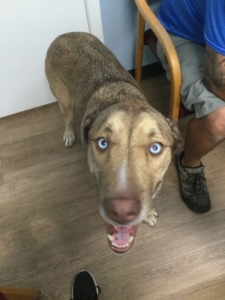What is Kennel Cough? Rocky’s Story
 A recently adopted husky mix, Rocky came into Seminole Blvd. Animal Hospital last month whose owners were concerned about a cough, not wanting to eat and not acting like himself. The night before, Rocky had gotten a hold of a chicken bone at their BBQ, and his parents’ concern was that the bone could be stuck.
A recently adopted husky mix, Rocky came into Seminole Blvd. Animal Hospital last month whose owners were concerned about a cough, not wanting to eat and not acting like himself. The night before, Rocky had gotten a hold of a chicken bone at their BBQ, and his parents’ concern was that the bone could be stuck.
After a full physical exam, Dr. Clark concluded that there wasn’t any obstruction. However, Rocky was suffering from tracheobronchitis, more commonly referred to as “kennel cough”. Kennel cough is not uncommon at animal shelters due to large quantities of animals being housed in close proximity to one another, allowing for the infection to spread rather quickly. The stress of being housed in an environment such as this made Rocky more susceptible to contracting the virus, than those pets that have been vaccinated and kept at home. To treat the inflammation, Dr. Clark prescribed Rocky a round of antibiotics and after completing his treatment, Rocky is doing much better and is acting like his usual, happy go lucky self.
What is Kennel Cough?
Kennel cough is caused by inflammation in the upper airways as a result of exposure to any of these organisms:
• Bordetella bronchiseptica bacteria
• Canine adenovirus
• Parainfluenza virus
• Mycoplasma
Kennel cough is highly infectious and will spread from dog to dog. That is why it is important that if one of your pets is diagnosed with kennel cough, that you separate them from your other pets until they complete their treatment. The most evident sign that your pet is experiencing kennel cough is a cough lasting for several weeks; additional symptoms include:
• Loss of Appetite
• Lethargic (sluggish)
• Fever
• Nasal Discharge
• If you have a dog experiencing any of these symptoms, schedule an appointment right away to have them evaluated.
You can protect your pet from kennel cough and other harmful diseases with regular vaccines. Any dog who comes into contact with other dogs while boarding, doggie daycare facilities, or dog parks should be vaccinated against bordetella bronchiseptica, canine parainfluenza virus and canine adenovirus. At your next visit, one of our veterinarians will provide a recommended vaccine schedule specific for your pet.
